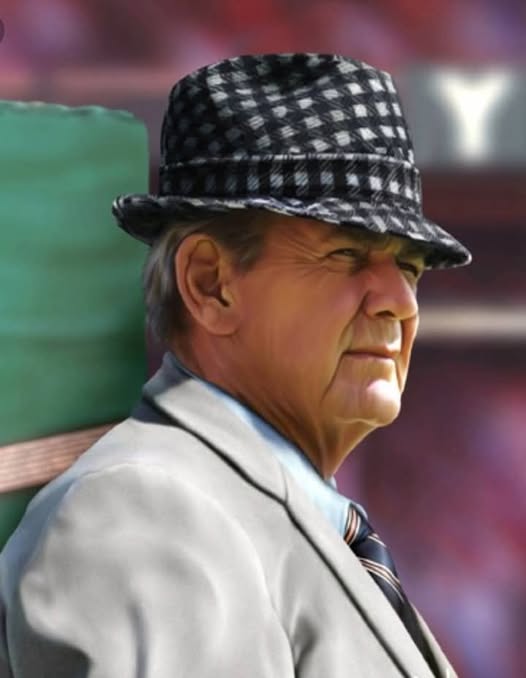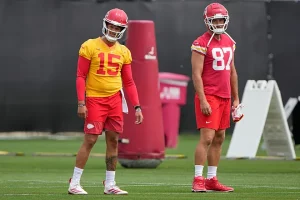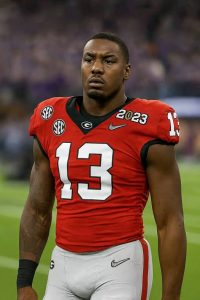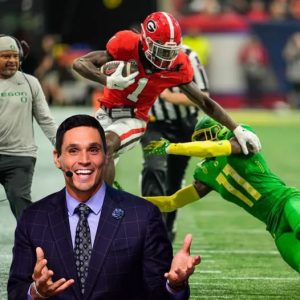
When ESPN released its highly anticipated deep-dive titled “The Greatest: Redefining College Football Legends,” few were surprised that Paul “Bear” Bryant topped the rankings. What shocked many, however, was the sheer breadth of influence the report unveiled—not just about his six national championships or his iconic houndstooth hat, but how Bryant fundamentally changed the archetype of a winning coach, pioneered modern recruiting, and laid the cultural foundation for the University of Alabama’s current dynasty.
The report, compiled over two years by ESPN senior writer Adam Rittenberg and a team of 25 analysts, uses decades of archival footage, performance metrics, former player interviews, and comparative data from every major college football era. And it arrives at a bold conclusion: Bear Bryant is not just the most successful coach of his era—he is the greatest college football coach of all time.
The Legend Behind the Numbers
Bryant’s record speaks volumes: 323 career wins, 14 SEC championships, six national titles, and 29 consecutive bowl game appearances. But ESPN’s new metric-driven analysis dives deeper. Using a proprietary rating system that evaluates coaches based on program elevation, consistency over decades, innovation, and player development, Bryant scored a perfect 100.
“Other coaches had great seasons. Bear Bryant built a culture that still echoes through college football today,” said Rittenberg. “What he did at Alabama was beyond coaching—it was cultural architecture.”
Bryant took over an Alabama program in 1958 that was languishing in irrelevance. In just four seasons, he brought home a national championship. The turnaround was nothing short of legendary, and it came through discipline, recruiting brilliance, and the molding of powerful running games.
Power and Precision: Redefining Running Backs
One of the most impactful revelations in ESPN’s report is Bryant’s role in redefining the power running back—players who could dominate the line of scrimmage and control the tempo of the game. In the age of flashy offenses and quarterback-first systems, Bryant was steadfast in his commitment to ground-and-pound football.
Running backs like Johnny Musso, Major Ogilvie, and Tony Nathan weren’t just athletes—they were enforcers. ESPN’s report credits Bryant with codifying the idea that running backs should be durable, intelligent, and capable of extending drives through sheer will.
“Bear created a pipeline,” said former Alabama fullback Kevin Turner in an interview with ESPN. “He made the running back the soul of the team.”
Bryant’s influence helped mold generations of power backs not only at Alabama but across the SEC. His legacy indirectly shaped future stars like Herschel Walker, Bo Jackson, Derrick Henry, and Najee Harris—players whose identities trace back to the philosophies he instilled.
Integration and Impact
One of the most nuanced sections of the ESPN report centers on Bryant’s role in integrating college football in the Deep South. Though often scrutinized for not moving quickly enough, the report argues Bryant played a pivotal role in facilitating progress.
When Bryant recruited Wilbur Jackson, the first Black scholarship athlete at Alabama, and then signed John Mitchell, the first Black player to take the field, it opened the floodgates. ESPN credits Bryant with using his enormous political capital to make the move both acceptable and strategically brilliant.
Mitchell, now an assistant head coach in the NFL, told ESPN: “Coach Bryant didn’t just bring me in to make a point. He wanted to win. He told me, ‘You’re not here to be a symbol. You’re here to play.’”
This helped shift the SEC into a new, more inclusive era—one that better reflected the full talent available to college football programs and redefined recruiting norms for decades to come.
Recruiting and the Rise of the Dynasty
Bryant’s recruiting philosophy, examined extensively in the ESPN report, set a precedent for what today’s programs now take as gospel: start early, evaluate character as much as ability, and build relationships.
He was one of the first coaches to fully embrace national recruiting, often traveling across the country to pluck talent from overlooked regions. In one legendary example, Bryant secured future All-American Leroy Jordan from Excel, Alabama—a town with no stoplights and fewer than 1,000 residents.
More importantly, Bryant didn’t just recruit football players—he built families. His “Bama Boys,” as they were known, formed a brotherhood that extended far beyond the field. ESPN highlighted how many former players remain closely tied to the program, serving as mentors to new generations.
“This wasn’t just about Saturdays,” said ESPN analyst Jesse Palmer. “Bryant was building something eternal.”
Training Methods and Mental Toughness
ESPN’s report devotes an entire chapter to Bryant’s rigorous training methods, which were sometimes criticized but largely viewed as transformative. His infamous Junction Boys camp at Texas A&M—where he took over before his Alabama tenure—is often cited as a crucible that forged winners.
At Alabama, Bryant tailored those philosophies into something even more effective: an uncompromising conditioning program that emphasized discipline, humility, and readiness. Players trained in sweltering heat, practiced full-contact scrimmages, and learned how to handle pressure through repetition and mental fortitude.
“No one went into a fourth quarter better prepared than a Bear Bryant team,” said ESPN’s senior historian Ivan Maisel. “He didn’t just teach toughness—he programmed it into their DNA.”
The Houndstooth Halo: Branding and Influence
Bryant’s image—stoic on the sideline, chewing gum, clad in his signature houndstooth fedora—has become a symbol of southern football royalty. ESPN’s report touches on his branding power long before NIL, social media, or corporate sponsorships.
“Bear Bryant was a brand before college coaches thought about being brands,” the report states. “He was the face of college football in the 1960s and ‘70s.”
The Alabama football brand, as we know it today, was built by Bryant. From the Million Dollar Band to the Elephant mascot, much of Alabama’s identity stems directly from his tenure. His ability to make college football cultural is one of the reasons ESPN ranks him above names like Knute Rockne, Tom Osborne, and even Nick Saban.
Saban and the Bear: Bridging Generations
ESPN’s report inevitably compares Bryant to Alabama’s current coaching legend, Nick Saban. The two titans share six national championships apiece at Alabama, and both are revered for different reasons—Bryant for legacy and identity, Saban for process and modern dominance.
Yet, as ESPN points out, Saban himself has paid constant homage to Bryant’s foundation. “Everything we do here is standing on the shoulders of what Coach Bryant built,” Saban said in a 2020 interview.
While statistical arguments can be made for either coach, ESPN’s panel argues that without Bryant, there is no Saban—no dominance, no blueprint, no Crimson Tide aura that intimidates opponents before kickoff.
“Bryant built Alabama’s empire. Saban renovated it. But the architect? That was Bear,” said Rittenberg.
Legacy That Transcends the Field
Perhaps the most poignant portion of the ESPN report reflects on Bryant’s broader legacy. His influence is seen in every Saturday tailgate, every college pregame speech, every player who lines up to “run it down their throat.”
He inspired books, movies, statues, and an entire coaching tree that includes Gene Stallings, Pat Dye, and dozens more. He instilled values that still define Alabama football: toughness, unity, humility, and excellence.
His funeral in 1983 drew over a quarter-million people to Tuscaloosa. As the report notes, few coaches in history—not even Saban—could command such loyalty even in death.




